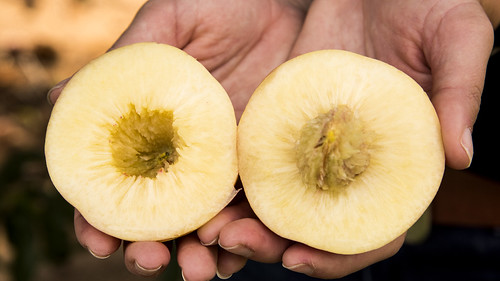New nectarine, ‘Effie,’ offers mid-acid flavor in white-flesh fruit
By Fred Miller
U of A System Division of Agriculture
Fast Facts:
- Effie nectarine has mid-acid flavor, white flesh, deep blush skin
- Firm fruit offers good storage and transportation
- Named for long-time Fruit Research Station employee
(391 words)
Download related PHOTOS: https://flic.kr/p/28vP2axand https://flic.kr/p/28vP2di
Related VIDEO: https://youtu.be/jWQYYHhL0vE
CLARKSVILLE, Ark. — A new white-flesh nectarine with mid-acid flavor offers a milder option for those who love the old fashioned “tang” of traditional yellow peaches but prefer milder acidity.

The sixth nectarine released from the University of Arkansas System Division of Agriculture’s fruit breeding program is named “Effie,” said fruit breeder Margaret Worthington. “It’s named for Effie Gilmore, a long-time employee of the division’s Fruit Research Station near Clarksville who contributed to many of the fruit varieties developed here,” she said.
Worthington describes Effie’s characteristics in an online video: https://youtu.be/jWQYYHhL0vE
Worthington said Effie has a distinct white nectarine flavor and the acidity falls between Amoore Sweet and Bowden. It has a firm, non-melting flesh that is distinctly crisp.
Effie has an attractive white flesh without red flecking or discoloration, Worthington said, and the skin has a full red blush. It is comparable to Amoore Sweet and Bowden in size at about 6.25 ounces.
Average date of full bloom is March 20 at the Fruit Research Station, comparable to other Division of Agriculture nectarines. Worthington said Effie has an average first ripening date of July 16.
“That makes it the latest ripening variety from the division’s breeding program,” Worthington said. “It ripens about a week after Amoore Sweet and Bowden and two weeks after Bradley.”
Effie has consistently good post harvest storage results, Worthington said. The fruit maintained acceptable flesh color, quality and flavor over three weeks of cold storage. “That should give it value for the retail shipping market as well as local markets,” she said.
The variety has moderate fruit and leaf resistance to bacterial spot, Worthington said.
“Effie should provide a high-quality option for growers in areas where bacterial spot disease is a concern,” Worthington said.
Effie trees budded on Lovell rootstock received good ratings for vigor and overall tree health, Worthington said. Crop load and yield were comparable to comparison cultivars during evaluations at the Fruit Research Station and the Southwest Research and Extension Center near Hope.
“Effie is an excellent midseason white nectarine that is well adapted to the mid- to upper-southern United States,” Worthington said. “I think it makes an excellent option for growers who want to diversify their offerings.”
Learn more about Division of Agriculture fruit breeding and research, including a list of licensed propagators and information about division varieties and management practices, online: https://www.uaex.uada.edu/farm-ranch/crops-commercial-horticulture/horticulture/commercial-fruit-production/
About the Division of Agriculture
The University of Arkansas System Division of Agriculture’s mission is to strengthen agriculture, communities, and families by connecting trusted research to the adoption of best practices. Through the Agricultural Experiment Station and the Cooperative Extension Service, the Division of Agriculture conducts research and extension work within the nation’s historic land grant education system.
The Division of Agriculture is one of 20 entities within the University of Arkansas System. It has offices in all 75 counties in Arkansas and faculty on five system campuses.
Pursuant to 7 CFR § 15.3, the University of Arkansas System Division of Agriculture offers all its Extension and Research programs and services (including employment) without regard to race, color, sex, national origin, religion, age, disability, marital or veteran status, genetic information, sexual preference, pregnancy or any other legally protected status, and is an equal opportunity institution.
Media Contact: Fred Miller
U of A Division of Agriculture
Arkansas Agricultural Experiment Station
(479) 575-5647
fmiller@uark.edu
Related Links